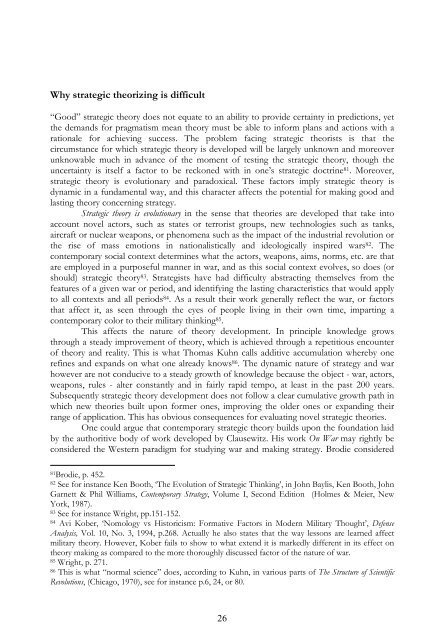Science, Strategy and War The Strategic Theory of ... - Boekje Pienter
Science, Strategy and War The Strategic Theory of ... - Boekje Pienter
Science, Strategy and War The Strategic Theory of ... - Boekje Pienter
You also want an ePaper? Increase the reach of your titles
YUMPU automatically turns print PDFs into web optimized ePapers that Google loves.
Why strategic theorizing is difficult“Good” strategic theory does not equate to an ability to provide certainty in predictions, yetthe dem<strong>and</strong>s for pragmatism mean theory must be able to inform plans <strong>and</strong> actions with arationale for achieving success. <strong>The</strong> problem facing strategic theorists is that thecircumstance for which strategic theory is developed will be largely unknown <strong>and</strong> moreoverunknowable much in advance <strong>of</strong> the moment <strong>of</strong> testing the strategic theory, though theuncertainty is itself a factor to be reckoned with in one’s strategic doctrine 81 . Moreover,strategic theory is evolutionary <strong>and</strong> paradoxical. <strong>The</strong>se factors imply strategic theory isdynamic in a fundamental way, <strong>and</strong> this character affects the potential for making good <strong>and</strong>lasting theory concerning strategy.<strong>Strategic</strong> theory is evolutionary in the sense that theories are developed that take intoaccount novel actors, such as states or terrorist groups, new technologies such as tanks,aircraft or nuclear weapons, or phenomena such as the impact <strong>of</strong> the industrial revolution orthe rise <strong>of</strong> mass emotions in nationalistically <strong>and</strong> ideologically inspired wars 82 . <strong>The</strong>contemporary social context determines what the actors, weapons, aims, norms, etc. are thatare employed in a purposeful manner in war, <strong>and</strong> as this social context evolves, so does (orshould) strategic theory 83 . Strategists have had difficulty abstracting themselves from thefeatures <strong>of</strong> a given war or period, <strong>and</strong> identifying the lasting characteristics that would applyto all contexts <strong>and</strong> all periods 84 . As a result their work generally reflect the war, or factorsthat affect it, as seen through the eyes <strong>of</strong> people living in their own time, imparting acontemporary color to their military thinking 85 .This affects the nature <strong>of</strong> theory development. In principle knowledge growsthrough a steady improvement <strong>of</strong> theory, which is achieved through a repetitious encounter<strong>of</strong> theory <strong>and</strong> reality. This is what Thomas Kuhn calls additive accumulation whereby onerefines <strong>and</strong> exp<strong>and</strong>s on what one already knows 86 . <strong>The</strong> dynamic nature <strong>of</strong> strategy <strong>and</strong> warhowever are not conducive to a steady growth <strong>of</strong> knowledge because the object - war, actors,weapons, rules - alter constantly <strong>and</strong> in fairly rapid tempo, at least in the past 200 years.Subsequently strategic theory development does not follow a clear cumulative growth path inwhich new theories built upon former ones, improving the older ones or exp<strong>and</strong>ing theirrange <strong>of</strong> application. This has obvious consequences for evaluating novel strategic theories.One could argue that contemporary strategic theory builds upon the foundation laidby the authoritive body <strong>of</strong> work developed by Clausewitz. His work On <strong>War</strong> may rightly beconsidered the Western paradigm for studying war <strong>and</strong> making strategy. Brodie considered81 Brodie, p. 452.82 See for instance Ken Booth, ‘<strong>The</strong> Evolution <strong>of</strong> <strong>Strategic</strong> Thinking’, in John Baylis, Ken Booth, JohnGarnett & Phil Williams, Contemporary <strong>Strategy</strong>, Volume I, Second Edition (Holmes & Meier, NewYork, 1987).83 See for instance Wright, pp.151-152.84 Avi Kober, ‘Nomology vs Historicism: Formative Factors in Modern Military Thought’, DefenseAnalysis, Vol. 10, No. 3, 1994, p.268. Actually he also states that the way lessons are learned affectmilitary theory. However, Kober fails to show to what extend it is markedly different in its effect ontheory making as compared to the more thoroughly discussed factor <strong>of</strong> the nature <strong>of</strong> war.85 Wright, p. 271.86 This is what “normal science” does, according to Kuhn, in various parts <strong>of</strong> <strong>The</strong> Structure <strong>of</strong> ScientificRevolutions, (Chicago, 1970), see for instance p.6, 24, or 80.26
















